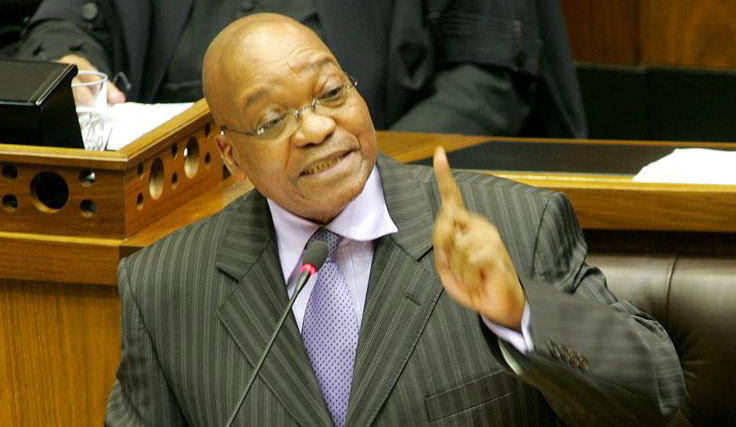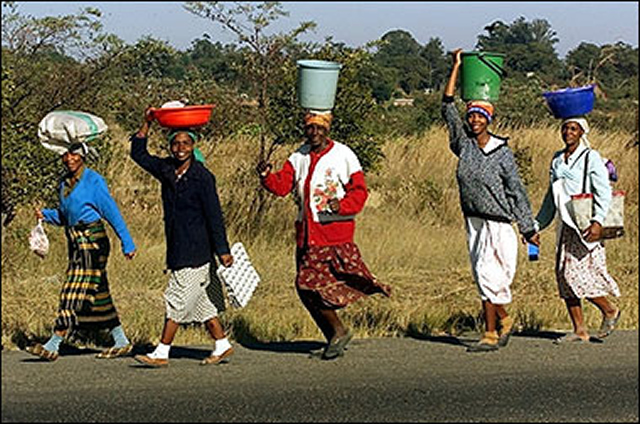Peace ho, Msholozi speaks

Joram Nyathi
LATE on Wednesday this week one media website carried a story in which South African President Jacob Zuma made unsavoury remarks about Africa’s interactions with Western nations on the one hand, and praised China on the other. The article seems to have had a very short lifespan.
The next time I checked so I could make specific quotations, it had vanished, completely, without trace.
To borrow from Alex La Guma, it had been “decreated”, perhaps so that it did not offend those who run the affairs of this globe and still view South Africa as their ideal home on the continent.
The gist of that article was that Africa had suffered a long history of exploitation in all its interactions with the West. In the course of the centuries from slavery through colonialism to neo-colonialism, the West has enjoyed unfettered access to African resources — human and natural.
Zuma said China was bringing new dynamics of equal partnerships, fair and balanced trade.
China was also investing in hard infrastructure, rather than coming in to cart away African natural resources or pontificate hypocritically about human rights.
Some of those who had read the story went into a fit of rage, under pseudonyms of course.
The most telling accusation was that Zuma was beginning to sound like Mugabe.
He was talking the language of Zimbabwe’s “Look East” Policy.
The comments by President Zuma and his being likened to President Mugabe reminded me of the South African cartoonist Zapiro and his showercap cartoons of Zuma.
He stopped them soon after Polokwane in 2007 when it became clear Zuma was headed for the Presidency.
He threatened to bring them back in the event of gaffes in future. Back then I wrote an article in which I indicated that Zuma was being blackmailed to stop championing the cause of the poor.
Reading through Wednesday’s article in which President Zuma’s grouched about Africa’s exploitative relationship with the imperialist West, I could imagine Zapiro licking his chops, sharpening his pen for a Zuma cartoon with the insulting showercap. The article I wrote back then was titled; “Zuma should reclaim his showercap”.
In Wednesday’s article, President Zuma spoke like he had recovered his Mshina Wami which was stolen soon after Polokwane. Watch this space for Zapiro.
President Zuma was not indulging in empty rhetoric.
He spoke as someone who is conscious of his nation’s global potential. He referred to South Africa being a member of the BRICS economic grouping led by China.
Other members are India, Russia and Brazil.
He also said South Africa was the 57th member of the Asia Infrastructure Investment Bank, another bold initiative backed by China to challenge America’s global dominance by offering alternative financing sources to the Bretton Woods institutions — the World Bank and the International Monetary Fund — in which, despite it being the second largest economy, China has no influence while the US and a few European powers enjoy veto power over their decisions.
Major European nations have joined as founding members of the AIIB, led by Britain against loud American protests.
On this one, for once in a long time the US was told to its face by Britain that there would be times “when we will have to differ”.
But President Zuma and his ANC face a conundrum of major proportions.
They have to deal with two diametrically-opposed forces, the far left Economic Freedom Fighters of Julius Malema on the one hand, and the right wing Helen Zille’s DA on which 34-year old Mmusi Maimane’s face has been emblazoned to lure more gullible black voters, on the other.
Meanwhile, the ANC seems to have been more comfortable playing near-centre left in keeping with the country’s neutralising constitution, thus allowing Malema first, and now more radical youths without political affiliation (the Rhodes Must Fall brigade), to steal the thunder of revolution by fighting to rid South Africa of colonial and apartheid symbols and black economic empowerment.
Either way, it is the ANC whose support base is being eroded.
On the one hand is the EFF. Should they appear to be more amenable to the radicalism of the anti-Rhodes brigade, they can easily win the sympathy of poor unemployed youths in black townships who have been clamouring for land reform and economic transformation.
The ANC must deliver and it is normally the youth and women who determine the victor in most elections in Africa.
That means the ANC has to move further to the left, closer to Malema, closer to Zanu-PF and Mugabe.
On the other hand Zille may have delivered a masterstroke by taking the back seat in the Democratic Alliance and putting a black face in the front seat. To the naked eye, the party has been “blackwashed”.
Those disaffected with the ANC but are anxious about the EFF and its radical policies can now safely cross to the black Democratic Alliance.
No qualms about betraying the African cause, after all some of them can lay a claim to a history of struggle against apartheid and white minority rule.
Once again it is the ANC whose support base is being undermined.
The clear message being that the ANC cannot continue for long to pretend that it holds the centre and hope to remain in power.
The name of Nelson Mandela is no longer enough to guarantee the ANC votes.
It has to make a decision, fairly fast too, whether it makes peace with Malema and more radical youth movements or allows itself to go the way of moribund movements like the Malawi Congress Party of Kamuzu Banda and Kenneth Kaunda’s United National Independence Party.
The threat posed by a black-faced DA to the ANC is not too dissimilar to a potential breakaway Zanu-PF branding itself in liberation war gab in Zimbabwe.
Those who have been funding opposition parties locally relish such a prospect, seeing in it a fine way to fix an unyielding Mugabe. Money is being dangled while alliances are mooted.
Of the three Presidents of South Africa since the end of apartheid, none was viewed as more radical than Zuma with his Mshina Wami trademark. Mandela was the steadying force in the immediate, volatile post-apartheid gale, wonderful for the transition.
Thabo Mbeki was a nice pro-business pan-Africanist who got sacrificed for his pragmatic handling of the Zimbabwean political crisis and refusal to abet British and American regime change projects.
He was lambasted in the right wing media both here and in his own country for letting down Tsvangirai and his MDC.
Those gone and current Cosatu leaders less combative and the Communist Party dead, it means future ANC leaders so far will be the business type, those least likely to upset the apartheid apple cart.
That is where we locate the country’s Vice President Cyril Ramaphosa and much of the new black middle class who don’t trust Malema and would view the DA as a safer bet in a supposedly non-racial South Africa. That is where money is likely to flow to counter Malema.
So, President Zuma might be making the right noise about the need for Africa to tame, or at least, balance the rules of engagement with the West, but the ANC needs first to adopt policies which win the votes to determine the way forward for an awakening South Africa.
Zimbabwe has already set the tone for Agenda 2063.
It only needs strong-willed drivers with a clear vision for a post-colonial Africa, leaders who are able to maintain unity by brushing aside non-essential distractions meant to undermine regional blocs and the African Union itself.











Comments